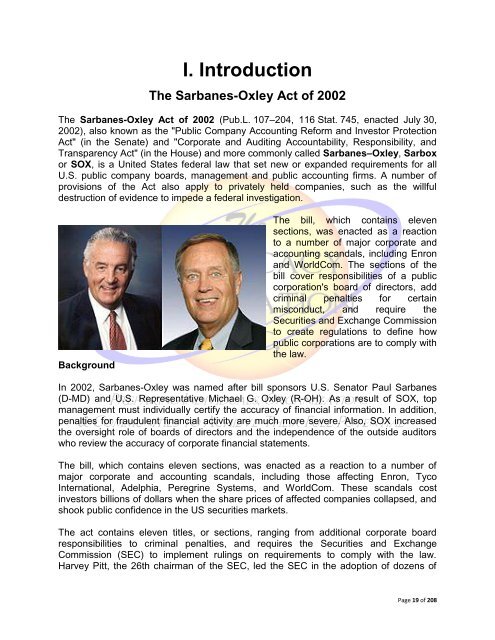The Sarbanes-Oxley Act of 2002
The Sarbanes-Oxley Act of 2002
The Sarbanes-Oxley Act of 2002
Create successful ePaper yourself
Turn your PDF publications into a flip-book with our unique Google optimized e-Paper software.
I. Introduction<br />
<strong>The</strong> <strong>Sarbanes</strong>-<strong>Oxley</strong> <strong>Act</strong> <strong>of</strong> <strong>2002</strong><br />
<strong>The</strong> <strong>Sarbanes</strong>-<strong>Oxley</strong> <strong>Act</strong> <strong>of</strong> <strong>2002</strong> (Pub.L. 107–204, 116 Stat. 745, enacted July 30,<br />
<strong>2002</strong>), also known as the "Public Company Accounting Reform and Investor Protection<br />
<strong>Act</strong>" (in the Senate) and "Corporate and Auditing Accountability, Responsibility, and<br />
Transparency <strong>Act</strong>" (in the House) and more commonly called <strong>Sarbanes</strong>–<strong>Oxley</strong>, Sarbox<br />
or SOX, is a United States federal law that set new or expanded requirements for all<br />
U.S. public company boards, management and public accounting firms. A number <strong>of</strong><br />
provisions <strong>of</strong> the <strong>Act</strong> also apply to privately held companies, such as the willful<br />
destruction <strong>of</strong> evidence to impede a federal investigation.<br />
Background<br />
<strong>The</strong> bill, which contains eleven<br />
sections, was enacted as a reaction<br />
to a number <strong>of</strong> major corporate and<br />
accounting scandals, including Enron<br />
and WorldCom. <strong>The</strong> sections <strong>of</strong> the<br />
bill cover responsibilities <strong>of</strong> a public<br />
corporation's board <strong>of</strong> directors, add<br />
criminal penalties for certain<br />
misconduct, and require the<br />
Securities and Exchange Commission<br />
to create regulations to define how<br />
public corporations are to comply with<br />
the law.<br />
In <strong>2002</strong>, <strong>Sarbanes</strong>-<strong>Oxley</strong> was named after bill sponsors U.S. Senator Paul <strong>Sarbanes</strong><br />
(D-MD) and U.S. Representative Michael G. <strong>Oxley</strong> (R-OH). As a result <strong>of</strong> SOX, top<br />
management must individually certify the accuracy <strong>of</strong> financial information. In addition,<br />
penalties for fraudulent financial activity are much more severe. Also, SOX increased<br />
the oversight role <strong>of</strong> boards <strong>of</strong> directors and the independence <strong>of</strong> the outside auditors<br />
who review the accuracy <strong>of</strong> corporate financial statements.<br />
<strong>The</strong> bill, which contains eleven sections, was enacted as a reaction to a number <strong>of</strong><br />
major corporate and accounting scandals, including those affecting Enron, Tyco<br />
International, Adelphia, Peregrine Systems, and WorldCom. <strong>The</strong>se scandals cost<br />
investors billions <strong>of</strong> dollars when the share prices <strong>of</strong> affected companies collapsed, and<br />
shook public confidence in the US securities markets.<br />
<strong>The</strong> act contains eleven titles, or sections, ranging from additional corporate board<br />
responsibilities to criminal penalties, and requires the Securities and Exchange<br />
Commission (SEC) to implement rulings on requirements to comply with the law.<br />
Harvey Pitt, the 26th chairman <strong>of</strong> the SEC, led the SEC in the adoption <strong>of</strong> dozens <strong>of</strong><br />
Page 19 <strong>of</strong> 208

















